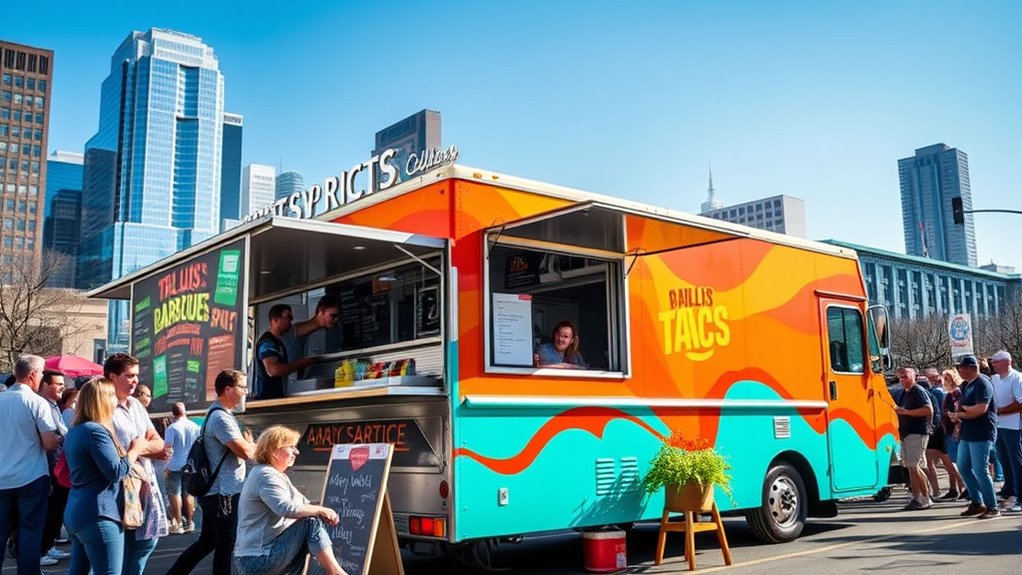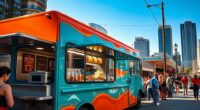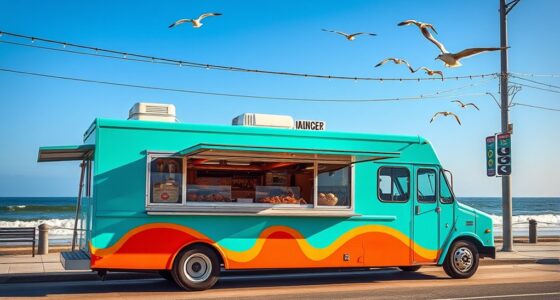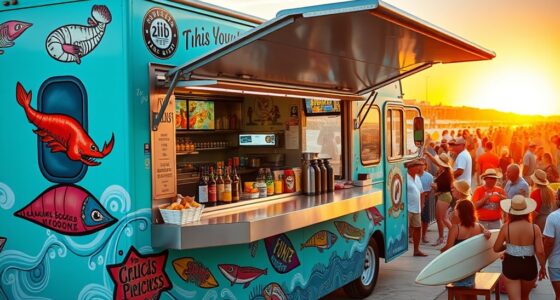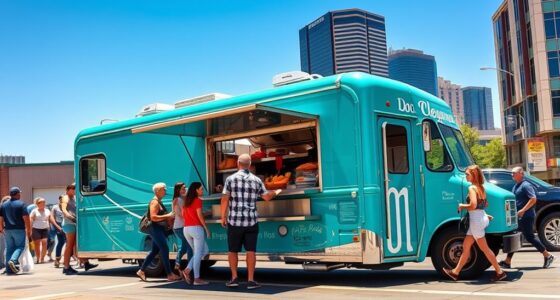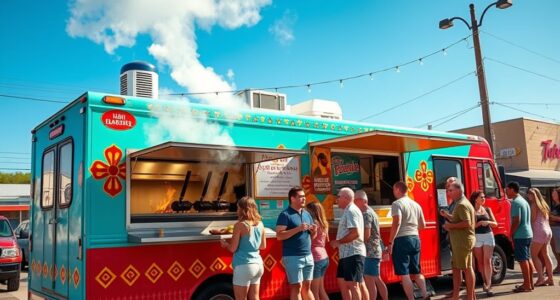Starting a food truck in Dallas, TX, is a smart move with the city’s growing demand for unique, flexible dining options. You’ll need to secure permits via the city portal, meet sanitation standards, and choose designated parking spots. Budget wisely for equipment and licensing, and develop a menu that appeals to local tastes. Leveraging eye-catching branding and social media, along with strategic locations and giveaways, can help build loyal customers—continue to explore how all these pieces fit together.
Key Takeaways
- Complete online permit applications through the Dallas city portal and ensure compliance with local sanitation and parking regulations.
- Choose a suitable, permitted location with high foot traffic and consider participating in local events for visibility.
- Invest in durable, mobile-friendly kitchen equipment and plan for installation, maintenance, and budget requirements.
- Develop a strong brand with eye-catching visuals and leverage social media, giveaways, and loyalty programs to build customer engagement.
- Utilize technology like contactless payments and inventory management to increase efficiency and streamline operations.
Food Truck Trend Resurgence

In recent years, the food truck industry has experienced a notable resurgence, driven by consumer demand for unique and flexible dining options. You’ll find that food truck cuisine now covers a wide range of flavors, from gourmet tacos to international street foods, appealing to diverse tastes. This trend’s success relies heavily on effective truck branding, which helps your vehicle stand out in crowded markets and attracts loyal customers. Strong branding creates recognition and communicates your food’s personality, making it easier for people to remember and seek out your truck. As the industry continues to grow, leveraging innovative food truck cuisine and eye-catching branding becomes essential for standing out and building a successful food truck business in Dallas. Incorporating security zone info strategies can also help protect your investment and ensure smooth operations in a competitive environment.
Understanding Local Requirements
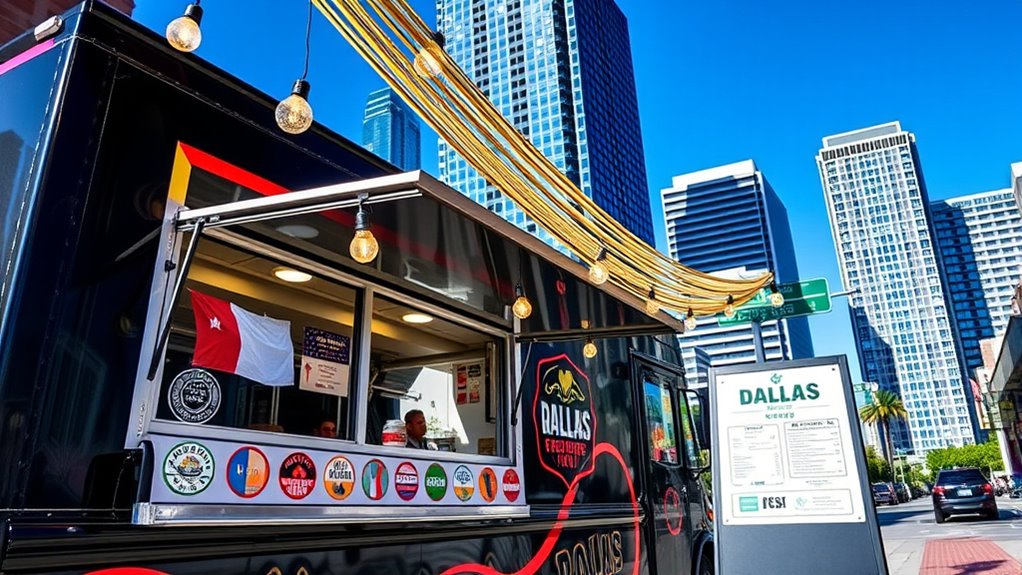
To get started, you’ll need to complete the online permit application through Dallas’s city portal. Make sure you meet sanitation standards and gather all necessary documentation to prevent delays. Also, familiarize yourself with designated street parking zones to ensure your truck is compliant and easily accessible. Additionally, researching popular juice brands can help you incorporate healthy beverage options into your menu, appealing to health-conscious customers.
Online Permit Application Process
Understanding Dallas’s local requirements is essential before applying for your food truck permit online. The city offers a streamlined process through online portals, making it easier to navigate the application. You’ll need to gather necessary documents and complete digital permits submissions via the city’s official website. The online application process typically involves filling out forms, uploading required documentation, and paying fees electronically. Be sure to review specific city guidelines to ensure your application aligns with local regulations. Once submitted, you can track your permit status through the portal, receiving updates and notifications directly. Using digital permits simplifies the process, saving you time and reducing paperwork. Familiarizing yourself with the online application system ensures a smooth start to your food truck journey in Dallas.
Sanitation Standards and Documentation
Ensuring your food truck meets Dallas’s sanitation standards is crucial for legal operation and customer safety. You must follow strict guidelines for handwashing procedures and keep thorough documentation. Regularly complete a sanitation inspection checklist to guarantee compliance. This checklist covers cleaning surfaces, proper food storage, and maintaining equipment. Keep records of all inspections, staff training, and cleaning schedules to prove adherence to local health codes. Here’s an example of essential sanitation standards:
| Handwashing Procedures | Inspection Checklist | Documentation Needed |
|---|---|---|
| Wash hands thoroughly with soap | Clean food prep areas | Training certificates |
| Use single-use towels | Proper waste disposal | Inspection reports |
| Use gloves when necessary | Maintain sanitation logs | Maintenance records |
Following these steps helps ensure you meet Dallas’s sanitation standards efficiently.
Designated Street Parking Zones
Before setting up your food truck in Dallas, you need to identify the designated street parking zones where you’re allowed to operate. Dallas’s parking enforcement strictly monitors street parking, so understanding where you can legally park is essential. Look for street signage indicating permitted zones, hours, and any restrictions. These signs clearly mark areas approved for food trucks, helping you avoid fines or towing. Some zones may require special permits or time limits, so check local regulations beforehand. Always observe street signage carefully to ensure compliance. Parking enforcement officers regularly patrol these zones, so staying within designated areas prevents penalties. Knowing where you can park legally helps you operate smoothly and focus on serving customers without concerns about violations.
Setting Up Your Base of Operations
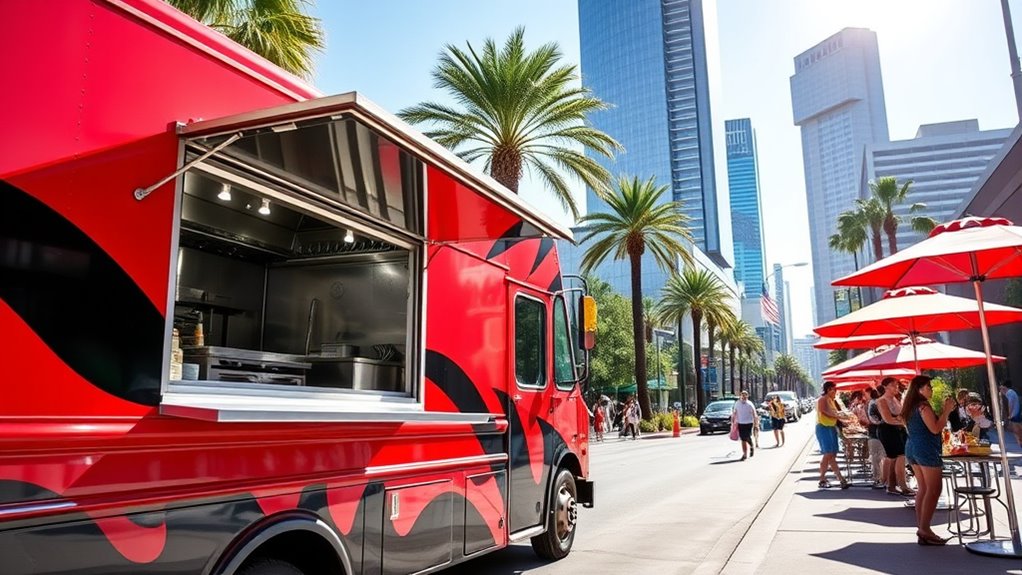
Choosing a shared kitchen can save you money on licensing fees and streamline your startup costs. It’s also important to select the right custom kitchen equipment that fits your menu and space constraints. Making these decisions early helps set a solid foundation for your food truck business. Additionally, understanding local regulations and Louisiana Alimony Laws can help you plan your business finances more effectively.
Shared Kitchen Licensing Fees
Setting up your food truck in Dallas often involves using a shared kitchen, which can substantially reduce your initial costs. Shared kitchen licensing fees vary depending on location and amenities, but they typically range from $300 to $1,000 per month. These fees cover kitchen licensing and ensure you meet health department standards. To help you understand the costs better, here’s a breakdown:
| Facility Type | Monthly Fees | Licensing Focus |
|---|---|---|
| Basic Shared Kitchen | $300 – $500 | Food prep and storage |
| Premium Kitchen | $600 – $800 | Expanded services |
| Fully Equipped | $900 – $1,000 | Licenses & equipment |
| Incubator Kitchen | Varies | Startup support |
| Flexible Use | Pay-as-you-go | Short-term licensing |
Understanding these shared kitchen fees helps you budget effectively for your food truck venture.
Custom Kitchen Equipment Selection
Are you selecting the right kitchen equipment to create an efficient and reliable food truck operation? Choosing custom kitchen equipment tailored to your menu ensures smooth service and durability. Focus on these key areas:
- Prioritize high-quality appliances designed for mobile use to withstand constant movement.
- Consider equipment maintenance needs to keep everything running smoothly and extend lifespan.
- Invest in versatile units that can handle multiple functions, saving space and increasing efficiency.
Custom kitchen equipment helps streamline your workflow and minimizes downtime. Regular equipment maintenance is crucial to prevent breakdowns and ensure safety. By selecting the right tools and maintaining them properly, you set a solid foundation for a successful food truck business in Dallas.
Budgeting and Financing Your Food Truck
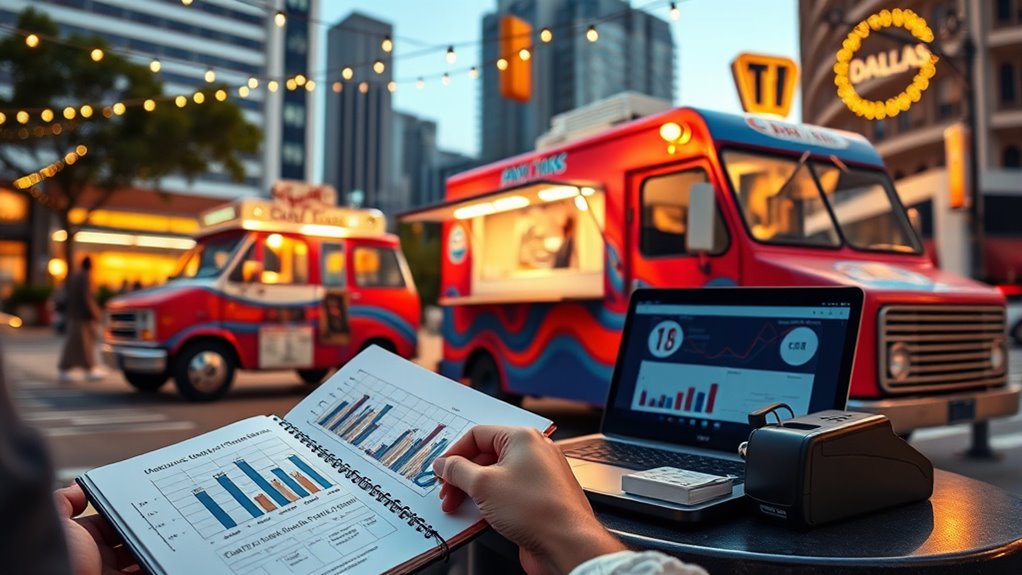
Budgeting and financing your food truck requires understanding your initial vehicle modification costs and where to find startup capital. You’ll also need to contemplate liability coverage to protect your business and assets. Knowing these points helps you plan effectively and avoid unexpected expenses down the road. Additionally, considering costs associated with toilet flushing can help you budget for sanitation and maintenance expenses in your overall business plan.
Initial Vehicle Modification Costs
Initial vehicle modification costs can vary widely depending on the size and complexity of your food truck setup, but you should plan to spend at least $30,000 to $100,000 to get your truck street-ready. Key expenses include essential upgrades such as:
- Vehicle wrapping to create an eye-catching design that attracts customers.
- Engine upgrades to ensure reliable performance and meet local regulations.
- Interior modifications like installing cooking equipment and storage solutions.
These costs can fluctuate based on the quality of materials and extent of customization. Prioritizing professional installation guarantees safety and durability, ultimately saving you money in the long run. Budget accordingly, and consider potential additional expenses for permits and inspections to avoid surprises.
Startup Capital Sources
Securing startup capital is a crucial step in launching your food truck, and there are several sources you can tap into to fund your venture. You might consider personal savings or seek loans from banks or credit unions. Crowdfunding platforms can also generate funds while building your brand’s food truck branding early on. Additionally, local small business grants or angel investors may be available if you present a solid business plan. Keep in mind that effective customer loyalty programs can boost revenue and help cover ongoing costs, reducing your need for large upfront capital. Proper budgeting ensures you allocate funds wisely, from vehicle modifications to marketing strategies. Exploring these diverse sources will give you a stronger financial foundation to start and grow your food truck business in Dallas.
Liability Coverage for Food Trucks
Because liability coverage is vital for protecting your food truck business, you need to factor it into your overall budgeting and financing plans. Meeting insurance requirements is essential to operate legally and safeguard against potential claims. Liability coverage helps cover costs related to accidents, injuries, or property damage. When budgeting, consider these key points:
- Understand the specific insurance requirements for food trucks in Dallas, TX.
- Allocate funds for all-encompassing liability coverage that protects your assets.
- Shop around for policies that balance affordability with adequate coverage levels.
Designing Your Menu and Pricing Strategy
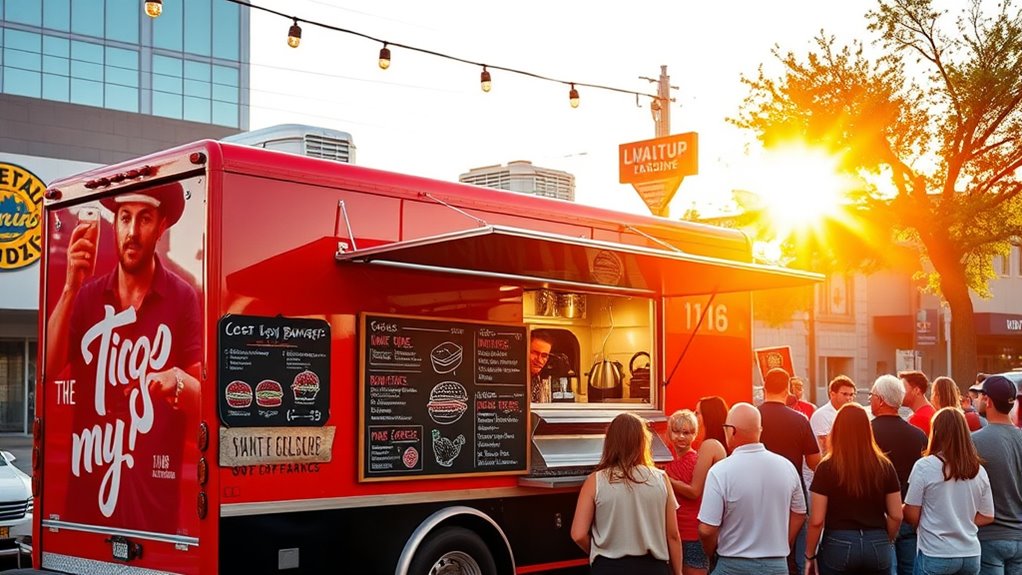
When designing your menu and pricing, consider sourcing ingredients locally to boost freshness and support the community. Calculating the cost per serving helps you set prices that cover expenses while remaining competitive. Balancing these factors guarantees your menu appeals to customers and keeps your business profitable. Additionally, incorporating health-conscious options can attract a broader customer base seeking nutritious choices.
Locally Sourced Ingredient Sourcing
In designing your menu and pricing strategy, sourcing ingredients locally in Dallas offers both quality and freshness that customers appreciate. Using locally sourced ingredients not only enhances flavor but also aligns with sustainable food practices. To maximize these benefits, consider these steps:
- Identify trusted local suppliers who prioritize fresh, seasonal produce and regional products.
- Build relationships with farmers and vendors committed to sustainable food practices, ensuring consistency and quality.
- Incorporate locally sourced ingredients into your menu, highlighting their freshness and eco-friendly origins to attract conscious customers.
Cost per Serving Calculations
Calculating the cost per serving is essential for setting your menu prices and ensuring your food truck remains profitable. To do this, you need to determine your food cost, which includes all ingredients used for each dish. Keep portion control in mind, as it helps you manage food waste and maintain consistency. By accurately measuring ingredients and tracking costs, you can figure out how much each serving costs you to produce. This allows you to set prices that cover your costs while providing a fair profit margin. Regularly reviewing these calculations ensures your pricing stays competitive and profitable as costs fluctuate. Mastering cost per serving keeps your food truck financially healthy and helps you make informed menu decisions.
Technology and Operations
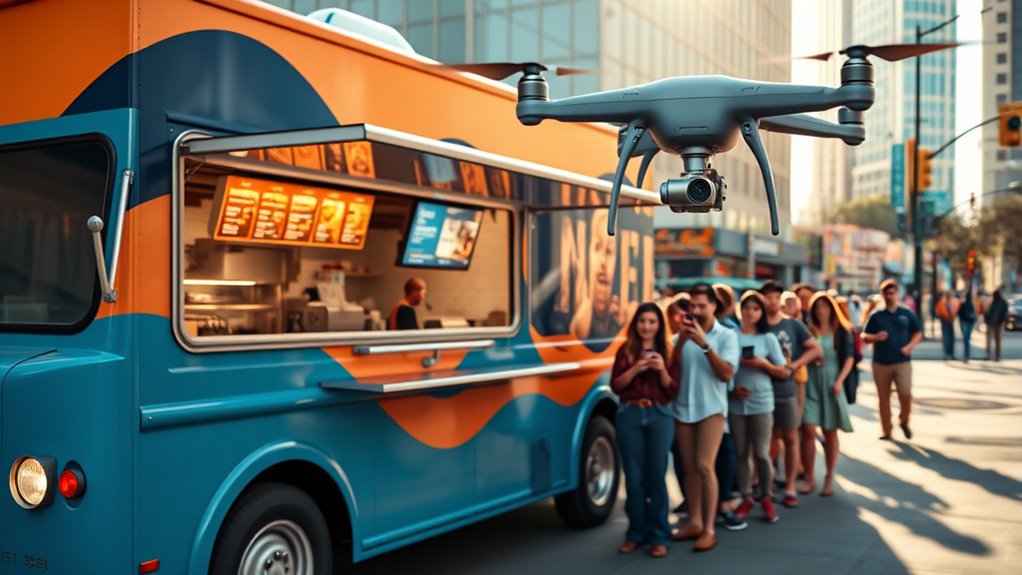
Implementing contactless payment options can speed up transactions and improve customer experience. Real-time stock tracking software helps you stay on top of inventory levels, reducing waste and ensuring you never run out of popular items. Embracing these technologies keeps your food truck efficient and competitive in Dallas’s busy food scene.
Contactless Payment Options Available
Adopting contactless payment options can streamline your food truck operations and enhance customer experience. By offering cashless transactions and mobile payment options, you make checkout faster and more secure. Customers appreciate the convenience of tapping their credit cards, smartphones, or digital wallets. To implement these options effectively, consider these key steps:
- Choose reliable payment platforms that support contactless payments.
- Integrate systems compatible with popular mobile wallets like Apple Pay and Google Pay.
- Train staff to assist customers with different payment methods smoothly.
With these strategies, you’ll reduce wait times, improve transaction security, and provide a seamless experience that keeps customers coming back. Contactless payment options are essential for modern food trucks seeking efficiency and customer satisfaction in Dallas.
Real-Time Stock Tracking Software
Integrating real-time stock tracking software into your food truck operations helps you stay on top of inventory levels and reduces waste. With effective inventory management, you can quickly identify which ingredients need reordering, preventing shortages or overstocking. This software provides instant updates, allowing you to monitor stock levels as sales occur, leading to more accurate profit analysis. By having real-time data, you can make informed decisions on pricing, portion sizes, and menu adjustments to maximize profitability. Additionally, tracking inventory in real-time minimizes spoilage and theft, saving you money. Overall, this technology streamlines your operations, enhances efficiency, and improves your ability to manage costs effectively, ensuring your food truck runs smoothly and profitably in Dallas’s competitive food scene.
Marketing and Growing Your Presence
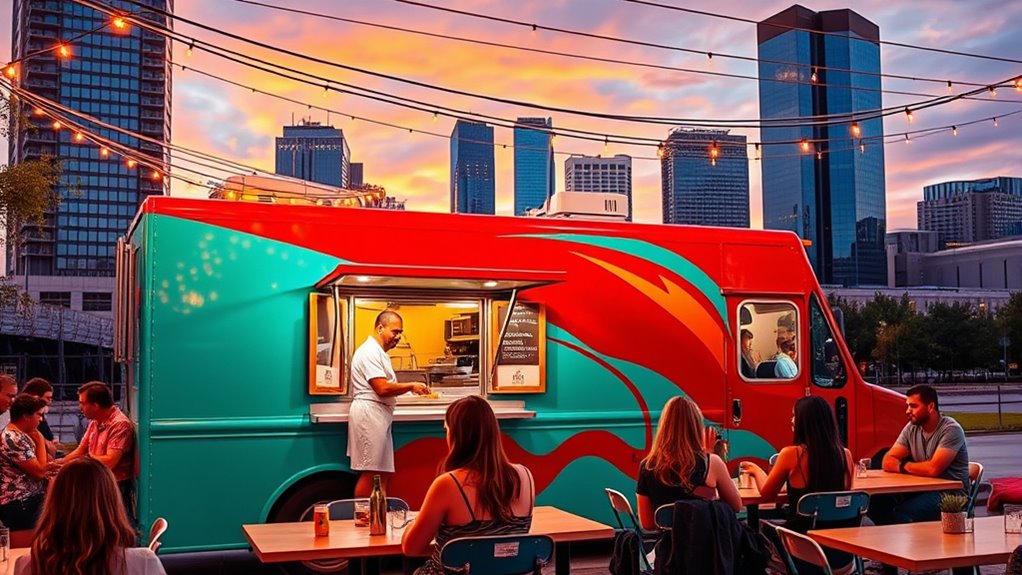
To boost your food truck’s visibility, focus on scheduling your appearances at popular events when potential customers are most likely to attend. Engaging with your audience through giveaways can turn casual passersby into loyal fans who share your location with friends. By combining smart event planning and interactive promotions, you’ll grow your presence and attract steady crowds.
Popular Event Scheduling Tips
Wondering how to maximize your food truck’s visibility at local events? Timing is everything. First, target popular food truck festivals, which draw large crowds and boost your exposure. Second, plan your schedule to avoid conflicts with major community events, ensuring you’re the main attraction. Third, leverage social media promotion by announcing your presence ahead of time, sharing updates, and posting real-time photos. This creates buzz and encourages followers to visit your truck. Consistent scheduling helps build anticipation and loyalty, turning event attendees into repeat customers. By strategically choosing your event dates and utilizing social media, you’ll increase visibility and grow your presence in Dallas’s vibrant food scene. Proper planning makes your food truck an unavoidable part of local gatherings.
Customer Engagement Through Giveaways
Customer engagement through giveaways is a powerful way to attract new customers and keep your current ones coming back. When you run contests on social media, you boost your visibility and encourage followers to share your food truck with their networks. Offer prizes like free meals, discounts, or branded merchandise to motivate participation. These giveaways not only generate excitement but also build customer loyalty by showing you appreciate their support. Make sure to promote your giveaways consistently across platforms and encourage customers to tag friends or share posts. This creates a ripple effect, expanding your reach in Dallas. Remember, engaging your audience through giveaways keeps your food truck top of mind and fosters a community of loyal customers enthusiastic to return.
Perfect Location Selection
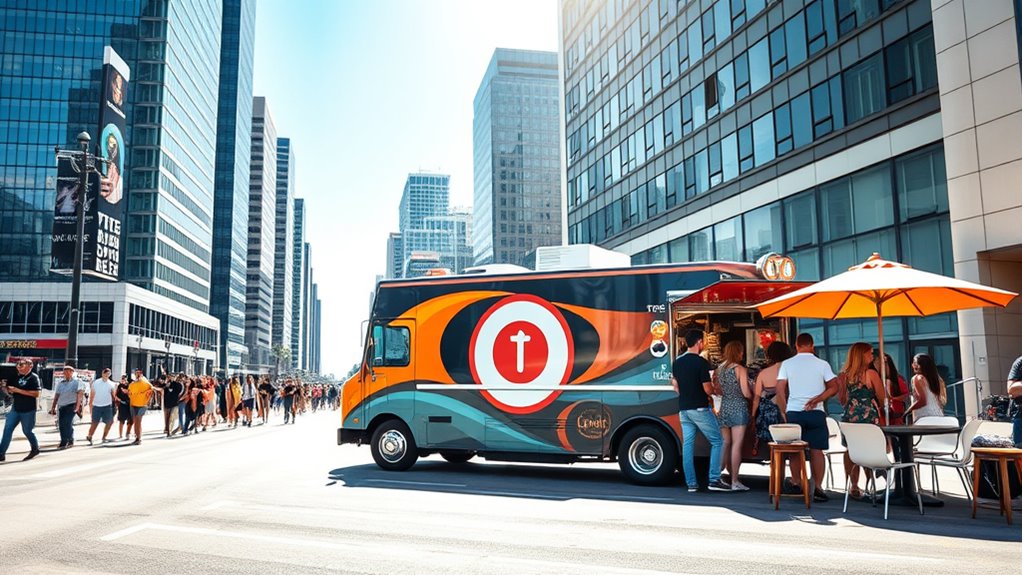
Choosing the right location is essential for the success of your food truck in Dallas. You need to take into account factors like neighborhood demographics and parking lot accessibility to attract steady customers. To make an informed choice, focus on these key points:
- Analyze neighborhood demographics to identify areas with high foot traffic and a customer base that matches your cuisine.
- Check parking lot accessibility to ensure customers can easily find convenient parking, encouraging repeat visits.
- Observe local events and nearby businesses that can boost your visibility and sales.
Frequently Asked Questions
What Permits Are Required to Operate a Food Truck in Dallas?
You’ll need a Dallas health permit and a mobile food vendor permit to operate your food truck. Additionally, secure a Dallas business license and a sales tax permit. For food truck branding, guarantee your signage complies with local standards. Setting up mobile payment systems is vital for customer convenience. Make sure your truck passes health inspections and adheres to city regulations to keep your operation smooth and compliant.
How Do I Find Reliable Food Truck Suppliers in Dallas?
A penny saved is a penny earned, so finding reliable food truck suppliers in Dallas starts with research. You can ask fellow vendors for recommendations, attend local food truck events, or browse online directories. Focus on suppliers that support your food truck branding and align with your quality standards. Use social media marketing to connect directly with suppliers, ensuring dependable partnerships that keep your truck rolling smoothly.
What Are the Most Popular Food Truck Cuisines in Dallas?
You’ll find that Tex-Mex, barbecue, and gourmet burgers top Dallas cuisine trends, resonating with customer preferences for bold flavors and comfort food. Food trucks serving fusion dishes and plant-based options are also gaining popularity, reflecting evolving tastes. To succeed, focus on offering unique, high-quality choices that align with what local customers crave, and stay updated on trends to keep your menu fresh and appealing.
How Do I Handle Waste Disposal and Sanitation Requirements?
You should develop a waste management plan that includes proper disposal of garbage and recycling, guaranteeing you follow Dallas’s sanitation standards. Regularly empty trash bins, use secure containers, and keep your truck clean to prevent pests and odors. Adhere to local health department regulations, maintain sanitary conditions, and document your cleaning routines. By staying proactive, you’ll ensure your food truck remains compliant and provides a safe, hygienic experience for your customers.
What Insurance Coverage Is Recommended for Food Trucks in Dallas?
You should get thorough food truck liability insurance to protect against accidents, injuries, and property damage. It’s essential for covering potential insurance claims process efficiently. In Dallas, make sure your policy includes general liability, vehicle coverage, and workers’ compensation if you have employees. Regularly review your coverage to match your food truck operations, and stay informed about local regulations to avoid gaps that could impact your insurance claims process.
Conclusion
Starting your food truck in Dallas is like harnessing the spirit of a roaring 20s speakeasy—full of energy, innovation, and endless possibilities. By understanding the local scene, setting up smart operations, and crafting a compelling menu, you’ll turn heads faster than a Model T on Main Street. Keep your marketing sharp and your location spot-on, and you’ll be serving up success in no time. Remember, every great journey begins with a single step—so get rolling!
